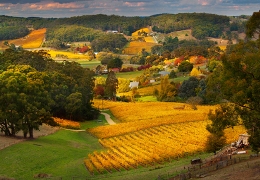10 June 2014
 South Australia’s Mount Lofty Ranges world heritage bid could boost the economy, create jobs and invigorate the state’s tourism sector, according to visiting UK expert James Rebanks.
South Australia’s Mount Lofty Ranges world heritage bid could boost the economy, create jobs and invigorate the state’s tourism sector, according to visiting UK expert James Rebanks.
The Managing Director and Head of Research at Rebanks Consulting based in England, Rebanks is the author of a recently completed study of all world heritage sites and their ability to deliver socio-economic benefits. A Herdwick sheep breeder and self-confessed ‘super nerd’ on the potential benefits of world heritage status, Rebanks is in Adelaide to deliver a free public lecture at the University of South Australia’s Bob Hawke Prime Ministerial Centre tomorrow (Wednesday) night.
His lecture will highlight what implications his world-wide research might have for the food, wine and tourism economy of the City of Adelaide gateway, and the Mount Lofty Ranges region.
Project manager for the Mount Lofty Ranges world heritage bid, Stephanie Johnston, says the lecture will give weight to the bid which, if successful, would protect and promote globally up to 150,000 hectares from the Fleurieu Peninsula to the Barossa Valley.
“If the bid is successful, it is the first time that farmland would be recognised with world heritage in Australia, although it has happened overseas,” Johnston says.
“World heritage listing from UNESCO is highly sought after, and there are only 12 agricultural landscapes that have been world heritage listed around the world.”
Existing world listings for agricultural landscapes include the Loire Valley in France, Cinque Terra in Italy and Tequila in Mexico. Johnston says six councils are supporting the bid, along with the University of Adelaide, RDA Barossa and McLaren Vale Grape Wine and Tourism because of the potential economic benefits.
“They see that a big part of the region’s future is valuing our agricultural landscapes,” she says.
Hawke Centre Executive Director Jacinta Thompson says the lecture with Rebanks is the second on the world heritage topic to be held at the Hawke Centre this year. The first, held in April, featured Professor Amareswar Galla from International Institute for the Inclusive Museum based in Copenhagen.
“We’re really pleased to be continuing the discussion with James Rebanks, examining what makes a site unique and globally important, and what are the social cultural and economic benefits of world heritage listing,” Thompson says.
Rebanks’ presentation, titled ‘UNESCO World Heritage Site Status: Is there opportunity for economic gain’, will be held in the Allan Scott Auditorium, Hawke Building, City West campus at 5.30pm for a 6pm start on Wednesday June 11. For more information and to register click here.
Media contact: Kelly Stone office 8302 0963 mobile 0417 861 832 email Kelly.stone@unisa.edu.au




